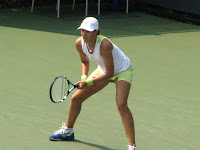
UPDATE: Still haven't found my pics but many thanks to Diane who sent me back one of my Srebotnik pics from last year's US Open.
Mostly this post is motivated by the fact that I have all these pics I take at tennis tournaments and never seem to use except to send to Diane over at Women Who Serve who uses them in the appropriate posts.
So here it is: my picture of Katatina Srebotnik who ousted Serena Williams today at Roland Garros. I, for some reason, really like Srebotnik. She has that certain female athlete swagger that I find attractive. I saw her at the US Open last summer which is where this picture is from.
[As I write it, big sister Venus Williams is teetering on the edge of upset as well. Maybe by the time I finish writing there will be a result.]
I don't have pictures of this but it does go with the theme. At yesterday's Women's College World Series--first day of play--number 1 seed Florida was upset by Louisiana-Lafayette. Also, Arizona State upset Bama though that was not as surprising given the Pac-10 versus SEC level of play/depth conversation.
[Yep, Venus is out. Beaten by Italian veteran Flavia Pennetta. There will be much discussion of whether Venus should have asked for play to be suspended because of darkness.]
Oops--now I'm upset. Because 1) something is wrong with ESPN2--there's frequent jitteryness. and 2) I can't find my pics from last year's US Open. I think my new computer--or maybe my old computer--ate them. I shall keep looking.
So here it is: my picture of Katatina Srebotnik who ousted Serena Williams today at Roland Garros. I, for some reason, really like Srebotnik. She has that certain female athlete swagger that I find attractive. I saw her at the US Open last summer which is where this picture is from.
[As I write it, big sister Venus Williams is teetering on the edge of upset as well. Maybe by the time I finish writing there will be a result.]
I don't have pictures of this but it does go with the theme. At yesterday's Women's College World Series--first day of play--number 1 seed Florida was upset by Louisiana-Lafayette. Also, Arizona State upset Bama though that was not as surprising given the Pac-10 versus SEC level of play/depth conversation.
[Yep, Venus is out. Beaten by Italian veteran Flavia Pennetta. There will be much discussion of whether Venus should have asked for play to be suspended because of darkness.]
Oops--now I'm upset. Because 1) something is wrong with ESPN2--there's frequent jitteryness. and 2) I can't find my pics from last year's US Open. I think my new computer--or maybe my old computer--ate them. I shall keep looking.